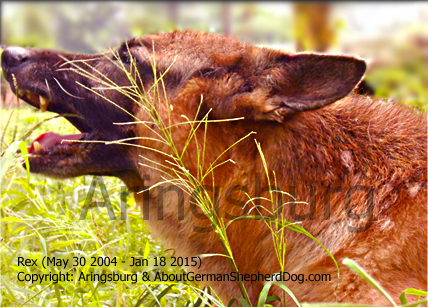Herbal Cure For Dogs
Herbal Treatment and Remedies for Your Dog...
Despite the fact that most veterinarian practitioners prefer chemical medicines as treatment for sick animals, certain herbs have also been found to have worked immensely good on specific conditions in animals. Medicinal herbs and their different parts have potentially good effects on canine health - specifically on certain conditions. However, it is important to consider several factors (current health condition, severity of the condition, food habits etc.) while treating a condition for your dog. There are thousands of medicinal herbs that have been documented to treat human ailments, but not all of them are effective and safe for dogs. Studies have shown that dog's habit of eating grass is nothing wrong... rather a healthy habit; however it is still not clear why actually they eat grass. While some says that dogs have instinctual craving for the components of specific types of grass, the other believe that dogs eat grass to recoup their nutritional deficiency in their regular diet. Researchers have been working to unearth the secret of this behavior. Herbal treatment have been quite effective for dogs, but herbs should be used mostly externally unless specifically advised to administer internally as food. While administering externally you may use herbal products fresh or dehydrated and may be used as ointments, compresses, poultices etc. Before using any herbal products we suggest you consulting a registered vet or a herbal medicine practitioner.
Here are a few herbs and parts that are beneficial for dogs' health:
Aloe vera The aloe vera is a fragile and luscious herb that grows best in tropical type of weather. Aloe Vera is particularly effective to comfort dermal inflammation due to insect bite, minor to medium burns, skin sores like Acral lick granulomas, which is really difficult to treat. Most interestingly this herb has astringent flavor, which is why dogs usually do not lick it when applied on the wound. Owing to its anti-bacterial properties, Aloe Vera gell can be used on cuts and surgeries.
Aloe vera possesses anti-bacterial characteristics and hence can be used during surgeries to induce the curative process. Another advantage of aloe vera is that when it is applied externally on animals, they will refrain from licking that part of the body owing to the herb's astringent flavor.Aloe Vera is natural a natural pain and itch reliever. Aloe Vera can be administered interlally in very small quantity as laxative. However, the yellow sap that comes out from Aloe known as aloin is harmful for dogs.
Ginger Ginger alleviates nausea. If you dog is suffering from carsickness (motion sickness), you can administer him a capsule enclosing powdered or crushed/grated ginger at least half an hour before starting the journey. Ginger in small quantity is also effective in healing indigestion and can comfort the dog. Ginger is quite effective in preventing cardiac disease, colitis, bronchitis, arthritis and loss of appetite in dogs. Ginger helps control vomiting due to indigestion. If your dog is going through chemotherapy as a part of cancer treatment ginger can be used in small quantity to prevent vomiting tendencies. however, too much of ginger will prove to be harmful for your dog. If administered more than needed it may cause digestive, heartburn, diarrhea, belching, and even bloat.
Hawthorn Hawthorn effectively repairs heart muscles and is a very good medication for dogs having cardiovascular ailments and for dogs that have suffered a congestive heart failure. Hawthorn promotes a healthy circulatory system, controls blood pressure and lower arrhythmia (irregular heart beats).
Parsley Parsley is a good dietary supplement for dogs. It is effective controls cancerous growths. Parsley also helps to promote proper functioning of all organs - especially liver functioning. This medicinal herb has prove to be effective in cleansing the blood stream by helping flushing off the body's toxin. If your dog is having a bad breath, parsley will help eliminating the bad odor. All these properties of parsley make the herb an ideal .
Fennel Seeds Fennel's ability to sooth the digestive tract and helps digestion makes it a choice for many herbalists to treat gastric problems and digestive tract irritation, flatulence or colic not only in human, but also in dogs and cats. With a flavor very different from mint many dogs like the taste of fennel tea. Although a very safe herb, it is suggested not to administer fennel tea or seeds to pregnant or lactating dogs. The volatile oils in fennel may cause photosensitive dermatitis dogs and cats, but such cases are very rare.
Burdock (Arctium lappa) Burdock Arctium lappa falls in the sunflower family that acts as an effective and natural remedy for hepatic ailment (liver problems). Burdock is rich in minerals that are essential for a dog to grow and keep healthy, like silicon, phosphorous, iron, calcium, inulin, thiamine and riboflavin. Apart from these Burdock is also a very rich source of Vitamin B2. This herb acts as an effective blood purifier for dogs having the ability to flush out toxins from the system.
Calendula (Calendula officinalis) Calendula falls under the Asteraceae family and has been highly admired by herbalists for its potential effectiveness not only for healing wounds, but a wide range of medicinal uses. Calendula works like magic for restricting infection and infected wounds. This herb can be used for healing minor to medium skin infection, lesions, minor to deep cuts, insect stings and even for healing minor burn injuries. Celendula keeps keeping your skin of your old or ill dog in proper tone. Even for atopic environmental skin allergies in dogs that secrete white fluids with bald patches, calendula lotion or ointment is a great solution.
Coltsfoot This is another medicinal herb that can be used by dog owners as cough dispeller. Coltsfoot - that are abundantly found all through England, has been an effective remedy for cough as it helps to get rid of phlegm. Coltsfoot also helps in controlling spams, kennel cough, and distressed breath. However, coltsfoot contain alkaloids that may be harmful for dogs. It is important to consult a herbalist before you give coltsfoot to your dog.
Starthorn Starthorn is a stout herb with thorns. Juice of starthorn leaves are extremely helpful if your dog is suffering from anemia. The juice is highly effective in treating diarrhoea, dysentery, urinary discharges, inflammations, constipation, anuria and cough; also applied for gleet, lumbago and pains in the joints. Dogs suffering from biliousness (excess secretion of bile) characterized by gastric distress should be given starthorn leaves juice continuously. If your dog is undergoing treatment for urinary tract stones or kidney stone then starthorn leaves juice will enhance the recovery process. If your dog hasn't been suffering from such problems, then administering this starthorn leaves juice will prevent your dog from developing such disorders. All you need is to make a cup of juice with 6 to 10 leaves and mix it with chicken/ beef broth.
Papaya leaves extract Easily available, fresh papaya leaves extract aids digestion in dogs, like humans. Not much research have been made yet regarding papaya leaves for dogs, but researchers have proved that papaya leaf tea has anti-cancer effects too.
Herbal treatments are mostly exercised to enhance the proper functioning of the body. It is not recommended to administer the herbs or herbal tonics in high volumes. Most importantly long term treatment is suggested for a proper cure. Many dogs avoid eating the herbs and herbal tonic directly. In such cases tablets made from herbs is the best option. It is important to know which herbs should not be ingested. Herbs that are not edible should not be given to your dog with or as food. However not all herbs that can be externally applied can be used for external use, because your dog can lick it. This page consist of names of herbs only that are not toxic to dogs if ingested. Read more...




















